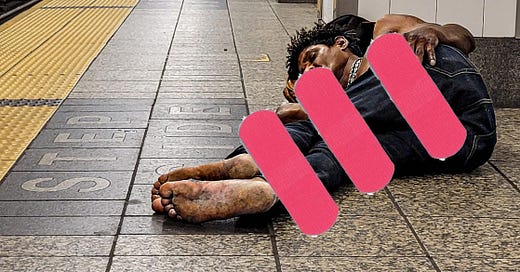A couple weeks ago, a 37 year old man set himself on fire outside the Courthouse where Donald Trump is currently being tried. By many accounts, Max Azzarello was a person who'd gone deep down the conspiracy rabbit hole. Coupled with his act of self-immolation, this strongly suggests mental illness, and tips my reaction to his horrible suicide toward sadness and empathy.
There are truly mentally ill among us, and present-day society has virtually no mechanism for dealing with them. We have the competing problems of a government that will misuse any tool it is given and the fact that there are non-compos-mentis individuals who cannot, definitionally, take responsibility for living their lives.
This makes for a difficult problem, and we all know that politicians run like rabbits from difficult problems.
It is very likely a majority, perhaps a significant majority, of the homeless in big cities like NY are mentally ill, but the difficulty of the problem, past abuses, and absolutist activists combine to ensure that nothing is done for them other than a revolving door of 911 calls and emergency services abuse.
At enormous cost, in both dollars and depletion of services. If an already-overtaxed emergency services system is routinely playing taxi driver to shuttle chronically homeless mentally ill people to hospitals, where they get checked over, fed, and released, it's inevitable that someone with a true medical emergency will suffer from a delayed response to a 911 call.
Unfortunately, such failures of government are rarely talked about, because they fall into "what might have been" territory. A heart attack victim might have been saved if the ambulance got there three minutes earlier, but that's a hard thing to pin down, and virtually no one other than the victim's family and friends has a strong interest in making that case. Yes, there are ambulance-chasing attorneys (irony intended) that can assist in a "too long" lawsuit, but that will only sap tax dollars rather than fix the problem.
This is the "difficult problem" conundrum. Politicians exist to get re-elected, and getting re-elected requires a combination of fundraising (which is what they spend most of their time doing), tallying political points, and avoiding like the plague any decisions or actions that could bite them in the ass. Difficult problems such as mental illness are Kryptonite, as in go near them only when there's absolutely no way to avoid doing so. And, usually, just long enough to make a gesture, never long enough to introduce a systemic remedy.
The shuttering of mental health hospitals across the middle-latter part of the 20th century was a mixed bag. On the one hand, changing attitudes and improved medicines made for less need for them. On the other hand, always trust government to get something wrong. The large numbers of mentally ill street people is proof of that.
Politicians nowadays know that voters don't reward them for tackling the tough stuff. They reward them for "bringing home the bacon," "pwning the other team," and for neon-hued bandaids (i.e. high visibility gestures that hide the problem rather than fixing it).
Public mental illness is a brutally difficult matter, both in principle and in practice, which is why it will persist. It joins many others tough issues, such as excess spending, the national debt, the entitlements Ponzi scheme, and the sprawling regulatory state, just to name a few.
Until voters start rewarding candidates who are willing to shoulder the risk of cracking these tough nuts, the problems will persist and grow. We can complain all day about how feckless our representatives are, but the voters bear the ultimate responsibility.





That’s a very good, excellent, exceptional column!
Just sent you the link. It’s below.